最新新译林版英语四年级下册Unit1-Unit4期中知识点和语法点复习
(完整word版)译林版小学四年级英语下册_知识点复习总结,推荐文档
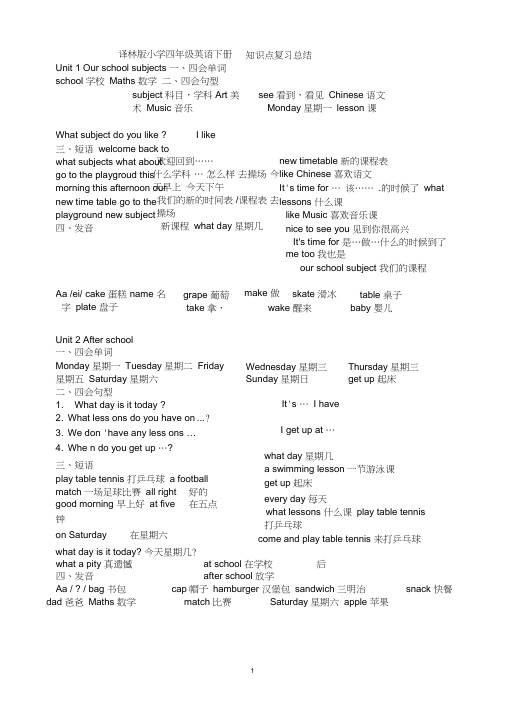
Unit 2 After school一、四会单词Monday 星期一 Tuesday 星期二 Friday 星期五 Saturday 星期六 二、四会句型1. What day is it today ?2. What less ons do you have on ... ?3. We don 'have any less ons …4. Whe n do you get up …?三、短语play table tennis 打乒乓球 a football match 一场足球比赛 all right 好的 good morning 早上好 at five 在五点钟on Saturday在星期六what day is it today? 今天星期几? It 's … I have I get up at …what day 星期几a swimming lesson 一节游泳课 get up 起床every day 每天what lessons 什么课 play table tennis 打乒乓球come and play table tennis 来打乒乓球what a pity 真遗憾 四、发音 at school 在学校 after school 放学后match 比赛 Saturday 星期六 apple 苹果译林版小学四年级英语下册 Unit 1 Our school subjects 一、四会单词 school 学校 Maths 数学 二、四会句型subject 科目,学科 Art 美术 Music 音乐 What subject do you like ? 三、短语 welcome back towhat subjects what aboutgo to the playgroud thismorning this afternoon ournew time table go to theplayground new subject 四、发音 I like知识点复习总结 see 看到,看见 Chinese 语文 Monday 星期一 lesson 课欢迎回到…… 什么学科 … 怎么样 去操场 今天早上 今天下午 我们的新的时间表 /课程表 去操场 新课程 what day 星期几 new timetable 新的课程表 like Chinese 喜欢语文 It 's time for … 该…… .的时候了 what lessons 什么课 like Music 喜欢音乐课nice to see you 见到你很高兴It's time for 是…做…什么的时候到了 me too 我也是our school subject 我们的课程 Aa /ei/ cake 蛋糕 name 名字 plate 盘子grape 葡萄 take 拿,make 做skate 滑冰 wake 醒来 table 桌子 baby 婴儿Aa / ? / bag 书包 cap 帽子 hamburger 汉堡包 sandwich 三明治 snack 快餐Wednesday 星期三 Sunday 星期日Thursday 星期三 get up 起床dad 爸爸 Maths 数学What can you do ? I can draw /make a cake …/ Good night. 三、短语 draw some pictures 画一些画 over there 那边draw them 画它们 this big box 这只大盒子 on the lake 在湖面上 in the park 在公园里 well done 好样的,干得好 in the boat 在小船里 a tree一棵树 on the hill 在小山上 make a cake 做一个蛋糕 四、发音e / e / bed 床 desk 课桌,书桌friend 朋友 them 他们 pencil 铅笔Unit 3 My day 、四会单词usually 通常 常常 二、四会句型 Whe n do you get up … I get up …at six /… 三、短语 go to school 上学 have lunch 吃午饭 have dinner 吃晚饭 over there 在那边 my day 我的一天 at seven 在七点 play football 踢足球 四、发音 E e / i: / me 我 weekhomework 家庭作业at seven forty 在七点四十分 inthe afternoon 在下午 every day 每天 a big cake 一块大蛋糕 four lessons 四节课 watch TV 看电视 in the evening 在晚上 she 她 green 睡觉 星期,周 see 看到 Unit 4 Drawing in the park一、四会单词park 公园 draw 画 flower 花 river 河,江lake 湖,湖泊二、四会句型in the morning 在早上 do my homework 做家庭作业 what time什么时间 like cakes 喜欢蛋糕 five subjects 四门课程 go to bed 睡觉 at night 在夜里 sleep 睡觉meet 遇见 three 三evening 晚上them 他们,她们,它们 boat 小船good idea 好主意 some flowers 一些花on the river 在河面上 have a look 看一看 try again 再试一试 some pictures 一些图画 can you draw 你会画吗? drawing in the park 在公园里画画 five trees 五棵树 see a boat 看到一条小船 before ten 十点之前pen 钢笔 red 红色的 ten 十 Wednesday 星期三 welcome 欢迎Unit 5 Seasons一、四会单词season 季节spring 春天,春季warm 温暖summer 夏天hot 热的,炎热的autumn 秋天,秋季cool 凉爽的,凉快的winter 冬天,冬季cold 冷的二、四会句型It is spring / summer / autumn / winter It is …I go …I like …三、短语in spring 在春天go boating 去划船eat ice cream 吃冰激凌in autumn 在秋天go climbing 去爬山make snowmen 堆雪人a fine day 晴朗的一天your bag 你的包look at 看…… .too short 太短了too long 太长了so big 真大my father's 我爸爸的so beautiful 真漂亮my hand 我的手like spring 喜欢春天a fine day 一个晴朗的日子very cold 非常冷all like the kite 都喜欢这个风筝四、发音i / ai / Chinese 语文kite 喜欢fine 晴朗的climb 爬lifly kites 放风筝in summer 在夏天go swimming 去游泳have picnics 举行野餐in winter在冬天go skating 去滑冰your jacket 你的夹克衫whose bag 谁的包my dress 我的连衣裙yourtrousers 你的裤子go to the party 去参加聚会whose gloves 谁的手套whose dress 谁的连衣裙can move 能移动four seas ons四个季节in autumn 在秋天a sunny day —个晴朗的日子here' syour jacket这儿有你的夹克衫like 喜欢time 时间white 白色的喜欢lion 狮子rice 米饭Unit 6 Whose dress is this ?一、四会单词dress 连衣裙party 聚会coat 外衣,外套shirt (男士)衬衫sweater 毛衣hand 手二、四会句型1. W hose … is this / that ?2. W hose … are these / those ?3. I think so . What'sthe matter?三、短语It's my father's …They're my father's …whose dress谁的连衣裙try this 试试这个try these试试这些let s go to the pa让我们去参加聚会look at my sweater看我的毛衣your long trousers 你的长裤all right 好的look at Su Yang gloves看杨玲的手套3so big 如此大my cousin ' s dr 我堂姐的连衣裙 you ' re wron 你错了 can move 能动my father ' s (我爸爸的上 sobeautiful 如此美丽 you ' re rig 你对了 what ' s the matt 怎r 么了 I think so 我认为是这样before eati ng fish 在吃鱼之前eat my cake by the lake 在湖边吃我的蛋糕 四、发音i / i / English 英语 fish 鱼 him 他(宾格) sixteen 十六 listen 听 picture 野餐 difficultUnit7 What 'sthe matter?一、四会单词bad 爸爸 water 水 ill 生病 tired 累的,疲劳的 happy 快乐的,高兴的 speak 说话,讲话 Mrs 夫人,太太二、四会句型I 'm …Thank you . have some water 喝些水 good night 晚安 have a cake 吃块蛋糕 come and have a pie 来 吃一个馅饼 have some water 喝 一些水 I ' m tire 我累了 good ni ght 晚安 I ' m thirst 我渴了 have a cake 吃一个蛋糕show Rose your nose 给罗斯看你的鼻子 here ' s a f 这儿有一把扇子 here ' s a hot d 吃一个热狗 no 不 nose 鼻子 open 打开 old 老的 only 仅仅 boat 船let ' s pl 让我们玩吧liste n to some En glish 听一些英语read and write 读和写 music 音乐 pig 猪困难的 1.What 'sthe matter ? Here's some /a …for you. 2. Good night .三、 短语have a pie 吃个馅饼 go to bed 睡觉 all right 好的 what ' s the matt 怎么了I ' m not hung 我不饿 here you are 给你 want to go to bed 想去睡觉 Mum and Dad 妈妈和爸爸 here ' s some wat 这里有水 go home 回家 take this pill 吃这片药have some watei 喝 一些水 talkabout feeli ngs 谈论感觉四、 发音O / / close 关 home 家go 去 cold 冷的Unit 8 How are you ? 一、四会单词may 可以 hear 听到,听见 二、四会句型May I speak to … ,please .Not so good . I have a cold / cough speak to 与……交谈 have a cold 感冒 see you tomorrow 明天见 at school 在学校 on Sunday 在星期日 this is Yang Ling speak ing 我是杨玲 come to school 来学校 take care 保重 see you 再见 have lessons 有课 上课 how are you 你好吗 用语) speak to Miss Li 和李老师通话go and see Doctor Wi 去看吴医生 have a cough and a headach 咳 嗽又头疼 make ateleph one cal 打 个电话 四、发音 O / / coffee 咖啡 dog 狗box 盒子 long 长的see you after schoo 放 学后再见talk about some illn ess 谈论一些疾病 hot 热 not 不是 sock 袜子 orange 橙子 sorry 对不起 clock 钟 can ' t come to school tod 今天不能来学校 have a cold and fever 感 冒又发烧 I ' m sorry to hear th 听到这事我很难过 have a headache^疼 not so good 不太好don ' t have any less ons on Sund S y 星期天不上课have a cough 咳嗽 the hot dog in the box 在盒子里的热狗 take care 保重 at school 在学校1. This is …speaking .2. I 'm sorry to hear that .3. How are you ? 三、 短语。
(完整版)译林版小学四年级英语下册知识点复习总结
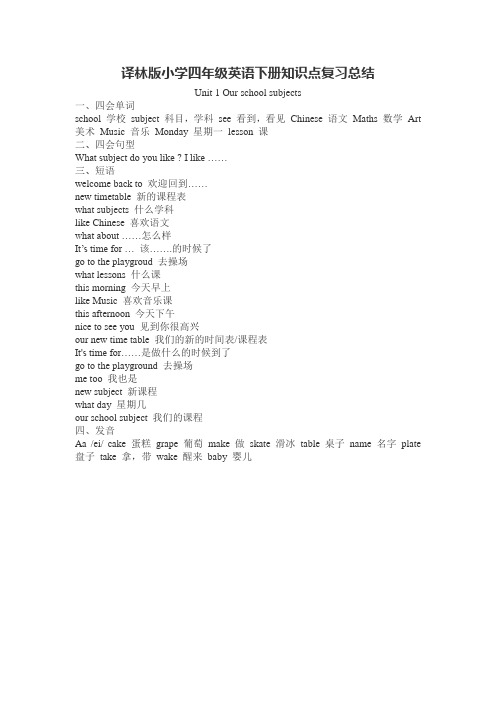
译林版小学四年级英语下册知识点复习总结Unit 1 Our school subjects一、四会单词school 学校subject 科目,学科see 看到,看见Chinese 语文Maths 数学Art 美术Music 音乐Monday 星期一lesson 课二、四会句型What subject do you like ? I like ……三、短语welcome back to 欢迎回到……new timetable 新的课程表what subjects 什么学科like Chinese 喜欢语文what about ……怎么样It’s time for … 该…….的时候了go to the playgroud 去操场what lessons 什么课this morning 今天早上like Music 喜欢音乐课this afternoon 今天下午nice to see you 见到你很高兴our new time table 我们的新的时间表/课程表It's time for……是做什么的时候到了go to the playground 去操场me too 我也是new subject 新课程what day 星期几our school subject 我们的课程四、发音Aa /ei/ cake 蛋糕grape 葡萄make 做skate 滑冰table 桌子name 名字plate 盘子take 拿,带wake 醒来baby 婴儿Unit 2 After school一、四会单词Monday 星期一Tuesday 星期二Wednesday 星期三Thursday 星期三Friday 星期五Saturday 星期六Sunday 星期日get up 起床二、四会句型1.What day is it today ? It’s ……2.What lessons do you have on ……?I have ……3.We don’t have any lessons …4.When do you get up …? I get up at ….三、、短语play table tennis 打乒乓球what day 星期几a football match 一场足球比赛a swimming lesson 一节游泳课all right 好的get up 起床good morning 早上好every day 每天at five 在五点钟what lessons 什么课on Saturday 在星期六play table tennis 打乒乓球what day is it today? 今天星期几?come and play table tennis 来打乒乓球what a pity 真遗憾at school 在学校after school 放学后四、发音Aa / æ / bag书包cap 帽子hamburger 汉堡包sandwich 三明治snack 快餐dad 爸爸Maths 数学match 比赛Saturday 星期六apple 苹果Unit 3 My day一、四会单词usually 通常常常homework 家庭作业二、四会句型When do you get up …I get up …at six /…三、短语go to school 上学at seven forty 在七点四十分in the morning 在早上have lunch 吃午饭in the afternoon 在下午do my homework 做家庭作业have dinner 吃晚饭every day 每天what time 什么时间over there 在那边a big cake 一块大蛋糕like cakes 喜欢蛋糕my day 我的一天four lessons 四节课five subjects 四门课程at seven 在七点watch TV 看电视go to bed 睡觉play football 踢足球in the evening 在晚上at night 在夜里四、发音E e / i: / me 我she 她green 睡觉sleep 睡觉three 三week 星期,周see 看到meet 遇见evening 晚上Unit 4 Drawing in the park一、四会单词park 公园draw 画flower 花them 他们,她们,它们boat 小船river 河,江lake 湖,湖泊二、四会句型What can you do ?I can draw /make a cake /… Good night.三、短语draw some pictures 画一些画good idea 好主意over there 那边some flowers 一些花draw them 画它们on the river 在河面上this big box 这只大盒子have a look 看一看on the lake 在湖面上try again 再试一试in the park 在公园里some pictures 一些图画well done 好样的,干得好can you draw 你会画吗?in the boat 在小船里drawing in the park 在公园里画画a tree 一棵树five trees 五棵树on the hill 在小山上see a boat 看到一条小船make a cake 做一个蛋糕before ten 十点之前四、发音e / e / bed 床desk 课桌,书桌pen 钢笔red 红色的ten 十friend 朋友them 他们pencil 铅笔Wednesday 星期三welcome 欢迎Unit 5 Seasons一、四会单词season 季节spring 春天,春季warm 温暖summer 夏天hot 热的,炎热的autumn 秋天,秋季cool 凉爽的,凉快的winter 冬天,冬季cold 冷的二、四会句型It is spring / summer / autumn / winter It is … I go … I like …三、短语in spring 在春天fly kites 放风筝go boating 去划船in summer 在夏天eat ice cream 吃冰激凌go swimming 去游泳in autumn在秋天have picnics 举行野餐go climbing 去爬山in winter 在冬天make snowmen 堆雪人go skating 去滑冰a fine day 晴朗的一天your jacket 你的夹克衫your bag 你的包whose bag 谁的包look at 看…….my dress 我的连衣裙too short 太短了your trousers 你的裤子too long 太长了go to the party 去参加聚会so big 真大whose gloves 谁的手套my father’s 我爸爸的whose dress 谁的连衣裙so beautiful 真漂亮can move 能移动my hand 我的手four seasons四个季节like spring喜欢春天in autumn在秋天a fine day一个晴朗的日子a sunny day一个晴朗的日子very cold非常冷here’s your jacket这儿有你的夹克衫all like the kite都喜欢这个风筝四、发音i / ai / Chinese 语文kite 喜欢like 喜欢time 时间white 白色的fine 晴朗的climb 爬like 喜欢lion 狮子rice 米饭Unit 6 Whose dress is this ?一、四会单词dress 连衣裙party 聚会coat 外衣,外套shirt (男士)衬衫sweater 毛衣hand 手二、四会句型1.Whose … is this / that ? It’s my father’s…2.Whose … are these / those ? They’re my father’s…3.I think so . What’s the matter?三、短语whose dress谁的连衣裙look at my sweater看我的毛衣try this试试这个your long trousers你的长裤try these试试这些all right好的let’s go to the party让我们去参加聚会look at Su Yang’s gloves看苏阳的手套so big如此大my father’s coat我爸爸的上衣my cousin’s dress我堂姐的连衣裙so beautiful如此美丽you’re wrong你错了you’re right你对了can move能动what’s the matter怎么了I think so我认为是这样let’s play让我们玩吧before eating fish在吃鱼之前listen to some English听一些英语eat my cake by the lake在湖边吃我的蛋糕read and write读和写四、发音i / i / English 英语fish 鱼him 他(宾格)music 音乐pig 猪sixteen 十六listen 听picture 野餐difficult 困难的Unit7 What’s the matter?一、四会单词bad 爸爸water 水ill 生病tired 累的,疲劳的happy 快乐的,高兴的speak 说话,讲话Mrs 夫人,太太二、四会句型1.What’s the matter ? I’m … Here’s some /a …for you. Thank you .2. Good night .三、短语have a pie 吃个馅饼have some water 喝些水go to bed 睡觉good night 晚安all right 好的have a cake 吃块蛋糕what’s the matter怎么了come and have a pie来吃一个馅饼I’m not hungry我不饿have some water喝一些水here you are给你I’m tired我累了want to go to bed想去睡觉good night晚安Mum and Dad妈妈和爸爸I’m thirsty我渴了here’s some wate r这里有水have a cake吃一个蛋糕go home回家show Rose your nose给罗斯看你的鼻子take this pill吃这片药here’s a fan这儿有一把扇子have some water喝一些水here’s a hot dog吃一个热狗talk about feelings谈论感觉四、发音O / / close 关home 家no 不nose 鼻子open 打开go 去cold 冷的old 老的only 仅仅boat 船Unit 8 How are you ?一、四会单词may 可以hear 听到,听见take care 保重at school 在学校二、四会句型1. This is …speaking . May I speak to … ,please .2. I’m sorry to hear that .3. How are you ? Not so good . I have a cold / cough三、、短语speak to 与……交谈come to school 来学校have a cold 感冒take care 保重see you tomorrow 明天见see you 再见at school 在学校have lessons 有课上课on Sunday 在星期日how are you你好吗this is Yang Ling speaking我是杨玲(电话用语)speak to Miss Li和李老师通话can’t come to school today今天不能来学校have a cold and fever感冒又发烧I’m sorry to hear that听到这事我很难过have a headache头疼not so good不太好have a cough咳嗽don’t have any lessons on Sunday在星期天不上课the hot dog in the box在盒子里的热狗go and see Doctor Wu去看吴医生see you after school放学后再见have a cough and a headache咳嗽又头疼talk about some illness谈论一些疾病make a telephone call打个电话四、发音O / / coffee 咖啡dog 狗hot 热not 不是sock 袜子box 盒子long 长的orange 橙子sorry 对不起clock 钟。
译林四年级英语Unit 1-4知识点
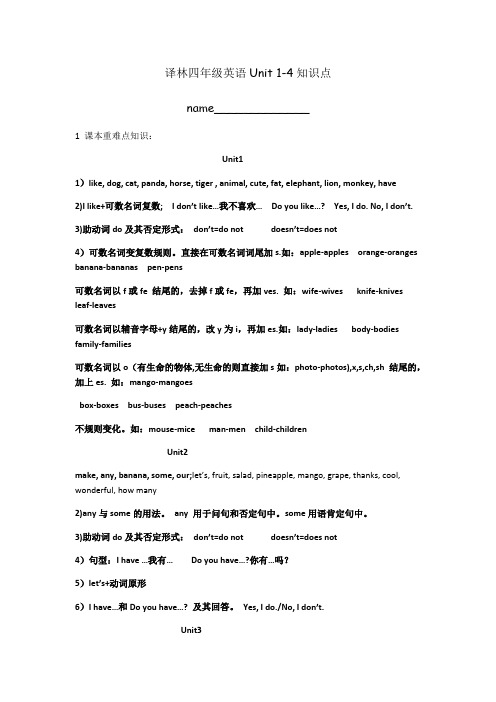
译林四年级英语Unit 1-4知识点name_____________1 课本重难点知识:Unit11)like, dog, cat, panda, horse, tiger , animal, cute, fat, elephant, lion, monkey, have2)I like+可数名词复数; I don’t like…我不喜欢…Do you like…? Yes, I do. No, I don’t.3)助动词do及其否定形式:don’t=do not doesn’t=does not4)可数名词变复数规则。
直接在可数名词词尾加s.如:apple-apples orange-oranges banana-bananas pen-pens可数名词以f或fe 结尾的,去掉f或fe,再加ves. 如:wife-wives knife-knivesleaf-leaves可数名词以辅音字母+y结尾的,改y为i,再加es.如:lady-ladies body-bodies family-families可数名词以o(有生命的物体,无生命的则直接加s如:photo-photos),x,s,ch,sh 结尾的,加上es. 如:mango-mangoesbox-boxes bus-buses peach-peaches不规则变化。
如:mouse-mice man-men child-childrenUnit2make, any, banana, some, our;let’s, fruit, salad, pineapple, mango, grape, thanks, cool, wonderful, how many2)any与some的用法。
any 用于问句和否定句中。
some用语肯定句中。
3)助动词do及其否定形式:don’t=do not doesn’t=does not4)句型:I have …我有…Do you have…?你有…吗?5)let’s+动词原形6)I have…和Do you have…? 及其回答。
新牛津译林版四年级下册英语全册知识点
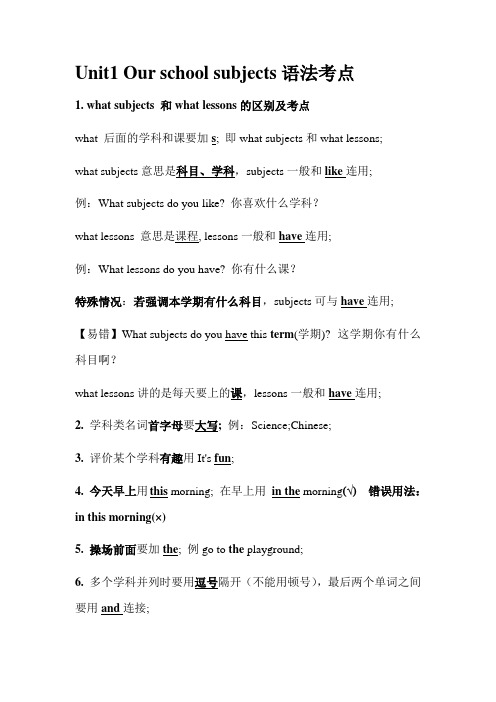
Unit1 Our school subjects语法考点1. what subjects 和what lessons的区别及考点what 后面的学科和课要加s; 即what subjects和what lessons;what subjects意思是科目、学科,subjects一般和like连用;例:What subjects do you like? 你喜欢什么学科?what lessons 意思是课程, lessons一般和have连用;例:What lessons do you have? 你有什么课?特殊情况:若强调本学期有什么科目,subjects可与have连用;【易错】What subjects do you have this term(学期)? 这学期你有什么科目啊?what lessons讲的是每天要上的课,lessons一般和have连用;2.学科类名词首字母要大写; 例:Science;Chinese;3. 评价某个学科有趣用It's fun;4. 今天早上用this morning; 在早上用in the morning(√) 错误用法:in this morning(×)5.操场前面要加the; 例go to the playground;6. 多个学科并列时要用逗号隔开(不能用顿号),最后两个单词之间要用and连接;例:We have Music, Art, PE and Maths.Unit2 After school语法考点1. 星期考点①星期一到星期天分别是(拼写):星期一Monday;星期二Tuesday;星期三Wednesday;星期四Thursday;星期五Friday;星期六Saturday;星期天Sunday;②英语中,一个星期的第一天是星期天;【易错】Sunday is the first(第一) day of a week(一周).③在星期几前面的介词用on; 即on + 星期几; 在星期几的上午或下午直接在星期后加morning或afternoon; 正确用法:on Sunday morning 在星期天上午(√) 错误用法:in the morning on Sunday(×)④对星期几提问特殊疑问词用What day; 回答星期几用It's + 星期几;2. It's time for / to考点(是时候做...)It’s time for后接名词例:It's time for school. school 为名词It's time to 后接动词词组例:It’s time to go to school. go to school为动词词组例:It’s time for lunch(名词). It’s time to have(动词) lunch.3. some、any 考点①some在部分疑问句和否定句中要改为any②用于征求对方意见并且希望得到肯定答复的时候,some无须改为any;总结为以下3种情况(1)Would you like some ... ? (2)What/How about some ... ? (3)Can I have some ...?4. like考点①like后接可数名词要用复数形式; 例:like mangoes②★能力题:like后接动词时要用动词ing形式; 例:like playing basketballUnit3 My day 知识点单词、词组、句子见书上1. 时间介词in, on, at 的考点in 考点①四季前介词用in, 中间不加任何冠词。
译林版四年级下册英语Unit1-4语法梳理复习

译林版四年级下册英语Unit1-4语法梳理复习Unit 1: Present Continuous Tense (现在进行时)The present continuous tense is used to talk about actions happening at the moment of speaking or actions that are happening around the current time.FormationThe present continuous tense is formed with the present tense of the verb "to be" (am, is, are) + present participle.Examples- I am reading a book right now.- She is eating lunch at the moment.- They are playing football in the park.Unit 2: Prepositions of Place (地点介词)Prepositions of place are used to describe the location or position of something or someone.- In: Used for enclosed spaces or larger areas (e.g., in the box, in China).- On: Used for surfaces (e.g., on the table, on the wall).- Under: Used for things that are below or beneath something (e.g., under the chair, under the bed).- Behind: Used to describe something located at the back of another object (e.g., behind the door, behind the car).- Next to: Used to describe something located beside or adjacent to another object (e.g., next to the tree, next to the supermarket).Unit 3: Plural Forms of Nouns (名词的复数形式)To form the plural of most nouns, add -s to the end of the singular noun.Examples- Cat → Cats- Dog → Dogs- Book → Books- Chair → Chairs- Toy → ToysUnit 4: Adjectives (形容词)Adjectives are words that describe or modify nouns. They provide more information about the noun in a sentence.Placement of adjectivesAdjectives are usually placed before the noun they modify.Examples- She has a beautiful dress.- He is a tall boy.- They live in a big house.。
(完整版)译林英语四年级下知识点和语法汇总
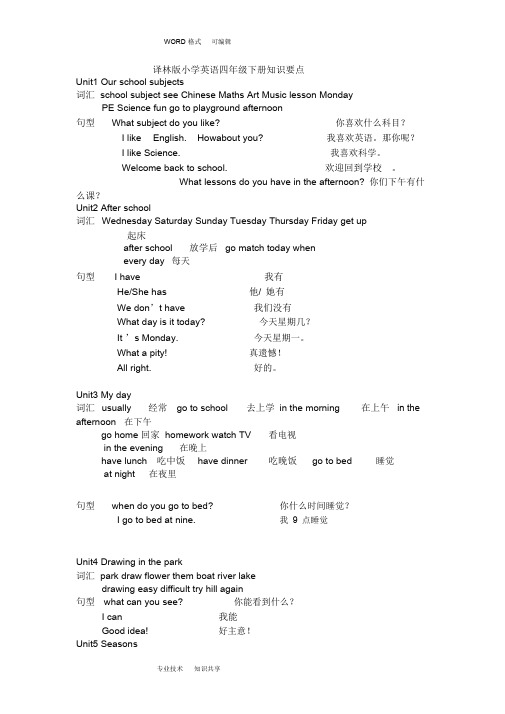
译林版小学英语四年级下册知识要点Unit1 Our school subjects词汇 school subject see Chinese Maths Art Music lesson MondayPE Science fun go to playground afternoon句型What subject do you like?你喜欢什么科目?I like English.Howabout you?我喜欢英语。
那你呢?I like Science.我喜欢科学。
Welcome back to school.欢迎回到学校。
What lessons do you have in the afternoon?你们下午有什么课?Unit2 After school词汇Wednesday Saturday Sunday Tuesday Thursday Friday get up起床after school放学后go match today whenevery day每天句型I have我有He/She has他/她有We don’t have我们没有What day is it today?今天星期几?It ’s Monday.今天星期一。
What a pity!真遗憾!All right.好的。
Unit3 My day词汇usually经常go to school去上学in the morning在上午in the afternoon在下午go home 回家 homework watch TV看电视in the evening在晚上have lunch吃中饭have dinner吃晚饭go to bed睡觉at night在夜里句型when do you go to bed?你什么时间睡觉?I go to bed at nine.我9点睡觉Unit4 Drawing in the park词汇 park draw flower them boat river lakedrawing easy difficult try hill again句型what can you see?你能看到什么?I can我能Good idea!好主意!Unit5 Seasons词汇 seasons spring warm summer hot autumn cool winter coldfly kite放风筝go boating去划船go swimming去游泳picnic goclimbing去爬山 go skating去滑冰fine whose句型in spring,it is warm在春天里,它是暖和的。
【考前划重点】四年级下册英语-期中复习——必记必背知识清单(Unit1-4)-译林版

译林版四年级英语下册——必记必背知识清单Unit 1 Our school subjects考点直通车一、我要掌握的单词四会单词school学校subject课程see看见,看到Chinese语文(课)Maths数学(课)Art美术(课)Music音乐(课)lesson课Monday星期一易错点提醒:课程类单词的首字母应大写。
三会单词timetable 课程表;时间表PE 体育(课)Science 科学(课)fun 乐趣,快乐playground 操场afternoon 下午二、我要掌握的短语our school subjects 我们学校的课程have English 有英语课welcome back to… 欢迎回到……our new timetable 我们的新课程表like Chinese 喜欢语文go to the playground 去操场what lessons 什么课this morning 今天早上what subjects 什么课程don’t like that 不喜欢那个come and make a cake 来做一个蛋糕三、我要掌握的句型The mouse said quietly. 老鼠小声地说。
考点突破营重难点1.Welcome back to school. 欢迎回到学校。
重点讲解:此句用来表达欢迎回到某地。
句中“welcome”在这里是感叹词,表示“欢迎”。
句型结构:Welcome back (to) +地点.注意:句中to后接表示地点的名词,如果“地点”是副词,to要省略。
例句:Welcome back to China! 欢迎回到中国!Welcome back home. 欢迎回家。
2. —What subjects do you like, Wang Bing? 你喜欢什么课程,王兵?—I like Chinese and Maths. 我喜欢语文和数学。
译林版四年级下册英语知识点归纳
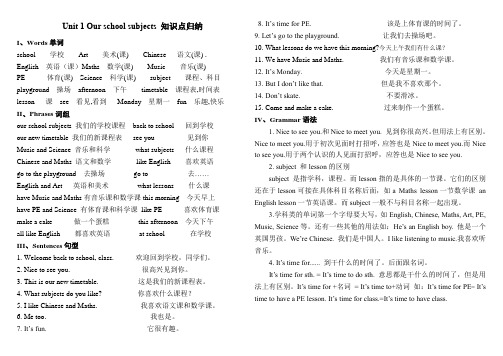
Unit 1 Our school subjects 知识点归纳I、Words单词school 学校Art 美术(课) Chinese 语文(课) . English 英语(课)Maths 数学(课) Music 音乐(课)PE 体育(课) Science 科学(课) subject 课程、科目playground 操场afternoon 下午timetable 课程表,时间表lesson 课see 看见,看到Monday 星期一fun 乐趣,快乐II、Phrases词组our school subjects 我们的学校课程back to school 回到学校our new timetable 我们的新课程表see you 见到你Music and Science 音乐和科学what subjects 什么课程Chinese and Maths 语文和数学like English 喜欢英语go to the playground 去操场go to 去…… English and Art 英语和美术what lessons 什么课have Music and Maths有音乐课和数学课this morning 今天早上have PE and Science 有体育课和科学课like PE 喜欢体育课make a cake 做一个蛋糕this afternoon 今天下午all like English 都喜欢英语at school 在学校III、Sentences句型1. Welcome back to school, class. 欢迎回到学校,同学们。
2. Nice to see you. 很高兴见到你。
3. This is our new timetable. 这是我们的新课程表。
4. What subjects do you like? 你喜欢什么课程?5. I like Chinese and Maths. 我喜欢语文课和数学课。
新译林版英语四年级下册Unit1-Unit4期中知识点和语法点复习
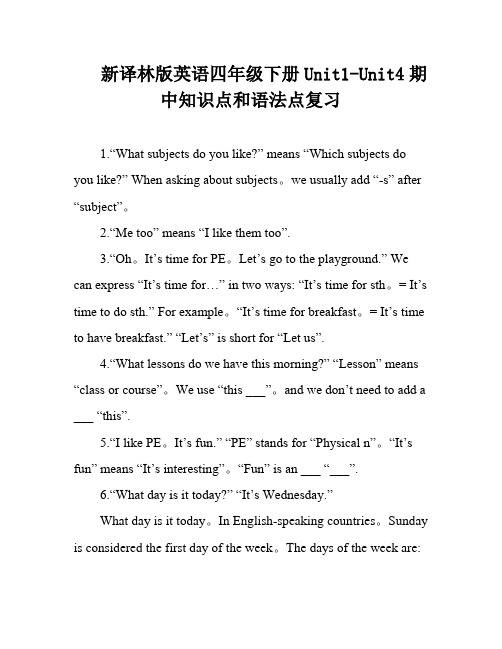
新译林版英语四年级下册Unit1-Unit4期中知识点和语法点复习1.“What subjects do you like?” means “Which subjects do you like?” When asking about subjects。
we usually add “-s” after “subject”。
2.“Me too” means “I like them too”.3.“Oh。
It’s time for PE。
Let’s go to the playground.” We can express “It’s time for…” in two ways: “It’s time for sth。
= It’s time to do sth.” For example。
“It’s time for breakfast。
= It’s time to have breakfast.” “Let’s” is short for “Let us”.4.“What lessons do we have this morning?” “Lesson” means “class or course”。
We use “this ___”。
and we don’t need to add a ___ “this”.5.“I like PE。
It’s fun.” “PE” stands for “Physical n”。
“It’s fun” means “It’s interesting”。
“Fun” is an ___ “___”.6.“What day is it today?” “It’s Wednesday.”What day is it today。
In English-speaking countries。
Sunday is considered the first day of the week。
(完整版)译林版四年级下册知识点
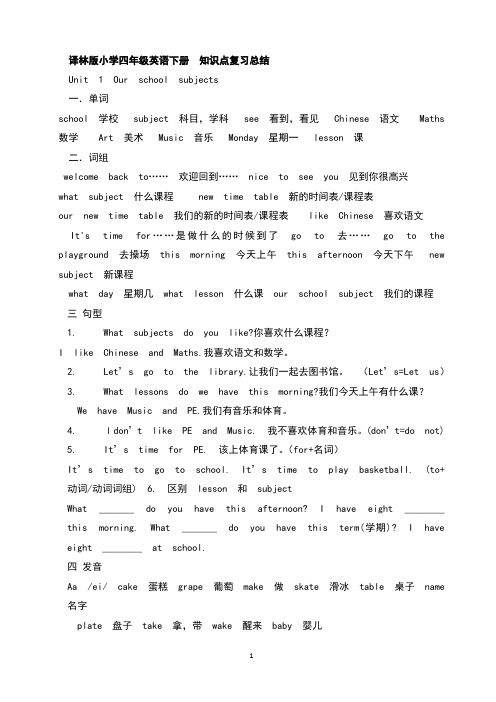
译林版小学四年级英语下册知识点复习总结Unit 1 Our school subjects一.单词school 学校 subject 科目,学科see 看到,看见Chinese 语文Maths 数学 Art 美术Music 音乐 Monday 星期一 lesson 课二.词组welcome back to……欢迎回到……nice to see you 见到你很高兴what subject 什么课程 new time table 新的时间表/课程表our new time table 我们的新的时间表/课程表 like Chinese 喜欢语文It's time for……是做什么的时候到了go to去……go to the playground 去操场this morning 今天上午this afternoon 今天下午 new subject 新课程what day 星期几what lesson 什么课our school subject 我们的课程三句型1.What subjects do you like?你喜欢什么课程?I like Chinese and Maths.我喜欢语文和数学。
2.Let’s go to the library.让我们一起去图书馆。
(Let’s=Let us)3.What lessons do we have this morning?我们今天上午有什么课?We have Music and PE.我们有音乐和体育。
4.Idon’t like PE and Music. 我不喜欢体育和音乐。
(don’t=do not)5.It’s time for PE. 该上体育课了。
(for+名词)It’s time to go to school. It’s time to play basketball. (to+动词/动词词组) 6. 区别lesson 和subjectWhat _______ do you have this afternoon? I have eight ________ this morning. What _______ do you have this term(学期)? I have eight ________ at school.四发音Aa /ei/ cake 蛋糕grape 葡萄make 做skate 滑冰table 桌子name 名字plate 盘子take 拿,带wake 醒来baby 婴儿五练习(一)、单项选择。
新译林版(三起)英语四年级下册全册知识点归纳

四军级下册英语知识点梳理(译林版三起)Unit 1-、重点单词school学校subject课程Chinese 语文(课)Maths数学Music盲乐(课)lesson课Monday星期一二、重点短语1.our school subjects2.like Chinese and Maths3.this morning4.this afternoon5.have lessons三、重点旬子1.Welcome back to school.2.Nice to meet you.3.What subjects do you like?4.I like Chinese and Maths.我们的学校课程喜欢语文和数学今天旱上今天下午上课欢迎回到学校。
很高兴见到你们。
你喜欢什么科目?我喜欢语文相数学。
5.What lessons do we have this morning?今天上午我们上什么课。
6.We have Music and Maths.我们上音乐和数学。
四、旬型结相对”你喜欢什么科目”的句型表达及回答:一What subjects do you like?…I like ...Unit 2Wednesday星期三Saturday星期六Sunday星期天Tuesday星期二Friday星期五get up起床二、重点短语1.a football match2.play table tennis3.a swimming lesson4.on Saturday5.get up三、重点旬子一场足球比赛打乒乓球一节游泳课在周六起床1.What day is it today?今天星期几?2.It’s Wednesday.今天星期三。
3.1 have a swimming lesson.我奇一节游泳课。
4.We don’t have any lessons on Saturday.我们周六没萄课。
5.What a pity !多么遗憾啊!6.AII right.好的。
完整版)译林英语四年级下知识点及语法汇总

完整版)译林英语四年级下知识点及语法汇总Unit 1: Our School SubjectsXXX。
For example。
"What subject do you like?" and "I like English。
How about you?"Unit 2: After SchoolIn this unit。
we learn about the different activities we can do after school。
such as playing games。
doing homework。
or going to a match。
We also learn how to talk about our daily routines and the days of the week。
For example。
"What day is it today?" and "It's Monday."Unit 3: My DayIn this unit。
we learn about the different parts of the day and what we usually do during each part。
We also learn how to talkabout our daily routines and the different activities we do。
such as going to school。
doing homework。
or watching TV。
For example。
"When do you go to bed?" and "I go to bed at nine."Unit 4: Drawing in the ParkIn this unit。
译林版四年级英语下册期中考试复习-U1-U4重点知识

Unit 1 Our school subjects
素养积累
其他课程:
特色课程:paper cutting 剪纸 computer programming 计算机编程 calligraphy 书法 dance 舞蹈 fencing 击剑
中学课程:物理 physics 化学 chemistry 生物 biology 历史 history 政治 politics 地理 geography
3. What a pity! 4. We don’t have any lessons on Saturday. 5. All right.
Unit 2 After school
素养积累
单元拓展:
今天是星期六,Zip在和Zoom谈论她繁忙的一周。一起来看看吧。 Zip: It’s Saturday today. Zoom, I’m always very busy Zoom: Why? Zip: Let me see. From Monday to Wednesday, I usually collect (收集) nuts (坚果) in the afternoon. Zoom: What else? Zip: On Thursday, I often dry (使……变干) my nuts in the sun. On Friday, I eat nuts with my friends. Zoom: What do you usually do on the weekend? Zip: I often watch TV, but this weekend I have a show (演出) . I’ll play the pipa. Zoom: When? Zip: Saturday, at 12 o’clock. Oh, no!
最新译林英语四年级下知识点及语法汇总备课讲稿
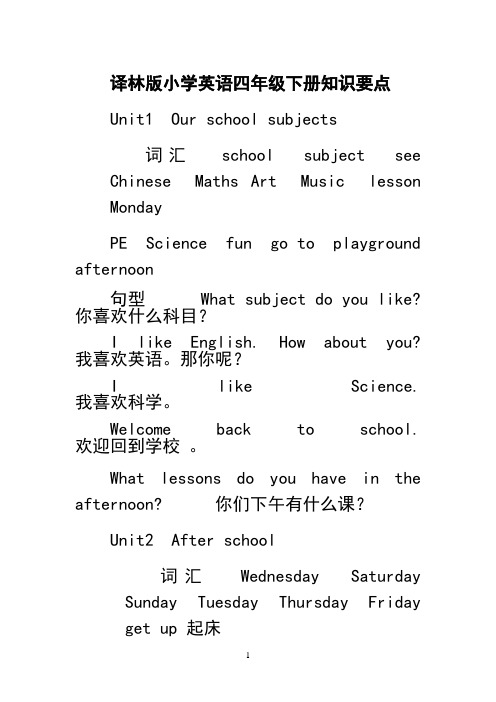
译林版小学英语四年级下册知识要点Unit1 Our school subjects词汇school subject see Chinese Maths Art Music lessonMondayPE Science fun go to playground afternoon句型 What subject do you like? 你喜欢什么科目?I like English. How about you? 我喜欢英语。
那你呢?I like Science. 我喜欢科学。
Welcome back to school. 欢迎回到学校。
What lessons do you have in the afternoon? 你们下午有什么课?Unit2 After school词汇Wednesday SaturdaySunday Tuesday Thursday Fridayget up 起床after school 放学后 go match today whenevery day每天句型I have…我有……He/She has…他/她有……We don’t have…我们没有……What day is it today? 今天星期几?It’s Monday. 今天星期一。
What a pity! 真遗憾!All right. 好的。
Unit3 My day词汇 usually经常 go to school 去上学 in the morning 在上午in the afternoon 在下午go home 回家 homework watch TV 看电视in the evening在晚上have lunch 吃中饭 have dinner 吃晚饭 go to bed 睡觉at night在夜里句型when do you go to bed? 你什么时间睡觉?I go to bed at nine. 我9点睡觉Unit4 Drawing in the park词汇park draw flower themboat river lakedrawing easy difficult try hillagain句型 what can you see? 你能看到什么?I can …我能……Good idea! 好主意!Unit5 Seasons词汇seasons spring warm summer hot autumn cool wintercoldfly kite放风筝 go boating 去划船go swimming 去游泳picnic goclimbing 去爬山go skating 去滑冰fine whose句型 in spring,it is warm 在春天里,它是暖和的。
Unit1-Unit4易错语法知识点汇总练习(讲义)-译林版英语四年级下册

how形容词/副词+主谓!
解题方法:先找出句中的主语和谓语;在判断主语前面的单词的词性;若是名词,则用what;若是形容词/副词,则用how
考题精练:
一、单项选择
( )1.sunny day!Let'sgooutforawalk.
A. How aB. How C.What aD. What
( )4.Is it timethe PE lesson?
A.for B.to have C.A and B
( )5.It’s timeclass.Hurry up!
A.to B.for C.in
( )6.It’s timehave a PE lesson.Let’s go to the playground.
一、选择题
( )1. It's timeEnglish class.
A. to B. for C. with D. /
( )2. It's timehave lunch.
A. to B. for C. with D. /
( )3. It's time forto have a PE lesson.
A. her B. he C. hers D. his
A. haveB.to haveC. having
( )2.—I can't do it.—Lethelp you.
A. weB. meC.our
( )3.—Letplay football, Tom.—Great!
A. weB. theyC. us
( )4.—Letgo home.It’s late.—All right.
A.can B.don’t C.can’t
新译林版英语四年级下册Unit1-Unit4期中知识点和语法点复习
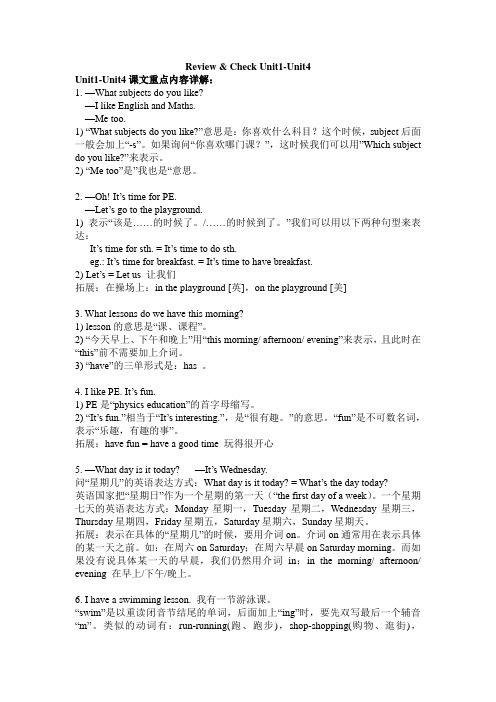
Review & Check Unit1-Unit4Unit1-Unit4课文重点内容详解:1. —What subjects do you like?—I like English and Maths.—Me too.1) “What subjects do you like?”意思是:你喜欢什么科目?这个时候,subject后面一般会加上“-s”。
如果询问“你喜欢哪门课?”,这时候我们可以用”Which subject do you like?”来表示。
2) “Me too”是”我也是“意思。
2. —Oh! It’s time for PE.—Let’s go to the playground.1) 表示“该是……的时候了。
/……的时候到了。
”我们可以用以下两种句型来表达:It’s time for sth. = It’s time to do sth.eg.: It’s time for breakfast. = It’s time to have breakfast.2) Let’s = Let us 让我们拓展:在操场上:in the playground [英],on the playground [美]3. What lessons do we have this morning?1) lesson的意思是“课、课程”。
2) “今天早上、下午和晚上”用“this morning/ afternoon/ evening”来表示,且此时在“this”前不需要加上介词。
3) “have”的三单形式是:has 。
4. I like PE. It’s fun.1) PE是“physics education”的首字母缩写。
2) “It’s fun.”相当于“It’s interesting.”,是“很有趣。
”的意思。
“fun”是不可数名词,表示“乐趣,有趣的事”。
拓展:have fun = have a good time 玩得很开心5. —What day is it today? —It’s Wednesday.问“星期几”的英语表达方式:What day is it today? = What’s the day today?英语国家把“星期日”作为一个星期的第一天(“the first day of a week)。
译林版英语四年级下册知识总结与整理

译林版英语四年级下册知识总结与整理本文档旨在对译林版英语四年级下册的知识进行总结和整理。
以下是各个单元的内容概述。
Unit 1 - Names and Numbers本单元主要研究了数字的表达方式,包括基础数字和序数词的运用。
通过与他人介绍自己的名字和年龄,学生可以提高自己的口语交流能力。
Unit 2 - My Home本单元介绍了家庭成员和家居环境的词汇,学生可以描述自己的家庭成员和家中的不同房间。
同时,通过研究日常活动的表达方式,可以提高学生的口语表达能力。
Unit 3 - Food and Drinks本单元研究了与食物和饮料相关的基本词汇,以及常见的餐桌礼仪。
学生可以研究如何用英语点餐和表达自己的饮食偏好。
Unit 4 - Sports and Hobbies本单元介绍了一些体育运动和兴趣爱好的词汇,学生可以谈论自己喜欢的运动和活动,并与他人进行交流。
Unit 5 - Weather and Seasons本单元研究了与天气和季节相关的基本词汇,学生可以在日常对话中谈论天气及变化,增加语言运用的机会。
Unit 6 - Occupations and Places本单元介绍了一些职业和常见的地点词汇,学生可以描述不同职业的工作内容和所在的地点。
Unit 7 - Festivals and Celebrations本单元研究了一些节日和庆祝活动的相关词汇,学生可以了解不同国家的传统节日,并与他人分享自己的庆祝俗。
Unit 8 - Travel and Transportation本单元介绍了旅行和交通工具的词汇,学生可以描述自己的旅行经历和不同交通工具的特点。
以上是译林版英语四年级下册的知识总结和整理。
通过学习这些内容,学生可以提高英语听说读写的能力,扩大词汇量,并增强跨文化交流的能力。
江苏译林版英语四年级下册单元知识词句总结
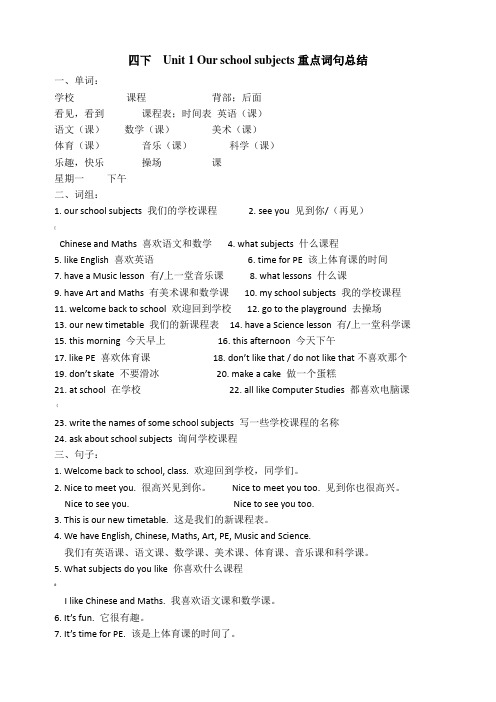
四下Unit 1 Our school subjects重点词句总结一、单词:学校课程背部;后面看见,看到课程表;时间表英语(课)语文(课)数学(课)美术(课)体育(课)音乐(课)科学(课)乐趣,快乐操场课星期一下午二、词组:1. our school subjects 我们的学校课程2. see you 见到你/(再见){Chinese and Maths 喜欢语文和数学 4. what subjects 什么课程5. like English 喜欢英语6. time for PE 该上体育课的时间7. have a Music lesson 有/上一堂音乐课8. what lessons 什么课9. have Art and Maths 有美术课和数学课10. my school subjects 我的学校课程11. welcome back to school 欢迎回到学校12. go to the playground 去操场13. our new timetable 我们的新课程表14. have a Science lesson 有/上一堂科学课15. this morning 今天早上16. this afternoon 今天下午17. like PE 喜欢体育课18. don’t like that / do not like that不喜欢那个19. don’t skate 不要滑冰20. make a cake 做一个蛋糕21. at school 在学校22. all like Computer Studies 都喜欢电脑课《23. write the names of some school subjects 写一些学校课程的名称24. ask about school subjects 询问学校课程三、句子:1. Welcome back to school, class. 欢迎回到学校,同学们。
- 1、下载文档前请自行甄别文档内容的完整性,平台不提供额外的编辑、内容补充、找答案等附加服务。
- 2、"仅部分预览"的文档,不可在线预览部分如存在完整性等问题,可反馈申请退款(可完整预览的文档不适用该条件!)。
- 3、如文档侵犯您的权益,请联系客服反馈,我们会尽快为您处理(人工客服工作时间:9:00-18:30)。
Review & Check Unit1-Unit4Unit1-Unit4课文重点内容详解:1. —What subjects do you like?—I like English and Maths.—Me too.1) “What subjects do you like?”意思是:你喜欢什么科目?这个时候,subject后面一般会加上“-s”。
如果询问“你喜欢哪门课?”,这时候我们可以用”Which subject do you like?”来表示。
2) “Me too”是”我也是“意思。
2. —Oh! It’s time for PE.—Let’s go to the playground.1) 表示“该是……的时候了。
/……的时候到了。
”我们可以用以下两种句型来表达:It’s time for sth. = It’s time to do sth.eg.: It’s time for breakfast. = It’s time to have breakfast.2) Let’s = Let us 让我们拓展:在操场上:in the playground [英],on the playground [美]3. What lessons do we have this morning?1) lesson的意思是“课、课程”。
2) “今天早上、下午和晚上”用“this morning/ afternoon/ evening”来表示,且此时在“this”前不需要加上介词。
3) “have”的三单形式是:has 。
4. I like PE. It’s fun.1) PE是“physics education”的首字母缩写。
2) “It’s fun.”相当于“It’s interesting.”,是“很有趣。
”的意思。
“fun”是不可数名词,表示“乐趣,有趣的事”。
拓展:have fun = have a good time 玩得很开心5. —What day is it today? —It’s Wednesday.问“星期几”的英语表达方式:What day is it today? = What’s the day today?英语国家把“星期日”作为一个星期的第一天(“the first day of a week)。
一个星期七天的英语表达方式:Monday星期一,Tuesday星期二,Wednesday星期三,Thursday星期四,Friday星期五,Saturday星期六,Sunday星期天。
拓展:表示在具体的“星期几”的时候,要用介词on。
介词on通常用在表示具体的某一天之前。
如:在周六on Saturday;在周六早晨on Saturday morning。
而如果没有说具体某一天的早晨,我们仍然用介词in:in the morning/ afternoon/ evening 在早上/下午/晚上。
6. I have a swimming lesson. 我有一节游泳课。
“swim”是以重读闭音节结尾的单词,后面加上“ing”时,要先双写最后一个辅音“m”。
类似的动词有:run-running(跑、跑步),shop-shopping(购物、逛街),sit-sitting(坐),jog-jogging(慢跑),chat-chatting(闲聊、聊天),etc.。
7. What a pity!(感叹句)真遗憾啊!类似的结构有:What a big egg! 多么大的一个鸡蛋啊!What a beautiful flower! 多么漂亮的一朵花啊!8. —What about Saturday? We don’t have any lesson on Saturday.—All right.1) “What about ... ?”= How about ... ? ……怎么样?此句型用来表示”提议和询问“,后接名词、代词和动名词形式。
eg.: What about going to the park? 去公园怎么样?How about going swimming? 去游泳怎么样?2) “don’t”是一般现在时中,当主语非第三人称单数时,疑问句和否定句中,要用do和don’t作助动词,后接动词原形。
拓展:当主语是第三人称单数(he, she, it)时,要用助动词does和doesn’t 。
3) all right = Ok拓展:That’s all right. 没关系。
/不用谢。
4) 在一般情况下,some用于肯定句,而any用于否定句和疑问句。
但当出现下列句型时,我们仍使用some,而不用any:—Would you like some bananas? 您要一些香蕉吗?—Do you want some tea? 您要一些茶吗?—Can I have something to drink? 我能要一些喝的吗?9. I get up at seven. I usually go to school at seven forty. I have four lessons in the morning. I have lunch at twelve.1) get up 起床与get相关的词组拓展:get on 上车get off 下车usually通常,是表示频度的副词,常用于一般现在时中。
在英语中,表示频率的副词还有:always总是,oftern经常,sometimes有时,seldom很少、极少,hardly几乎不,never从不,etc.。
2) go to school 去上学拓展:come/go home回家,go to bed去睡觉,go to hospital去医院,go to church 去做礼拜3) in the morning 在早上表示具体某一天的早晨、中午、晚上,要用介词on,如:on Saturday morning,on a cold evening4) have lunch 吃午饭拓展:have breakfast吃早饭,have supper = have dinner吃晚饭注意:在早、中、晚饭前不加定冠词“the”。
at seven/ senven forty/ twelve 都是表示具体的时间点,要用介词at 。
5) 具体时间的表达方式:在8点:at eight ( o’clock )在8点半:at half past eight = at eight thirty在8点10分:at ten past eight = at eight ten在8点50分:at ten to nine = at eight fifty在8点一刻:at a quarter past eight = at eight fifteen在8点三刻:at a quarter to nine = at eight forty-five练习:1: 58 的英语表达__________________________________________10. I have two lessons in the afternoon. I play football at four and go home at four forty. I do my homework at five thirty.1) “play”的用法:play + 运动名称,注意在运动名称前不能加定冠词“the”,如:play volleyball 打排球play + 棋牌类游戏名称,如:play (Chinese) chess 下(象)棋;play cards 打牌play + the + 乐器类名称,注意在乐器类名称前要加定冠词“the”,如:play the piano 弹钢琴;play the violin 拉小提琴;play the guitar 弹吉他play + with + sb.(某人)/ sth.(某物),如:play with me和我玩;play with ballons(气球)/ lanterns(灯笼)play games 玩游戏2) do one’s homework 做(某人的)家(庭)作(业)“work”作为名词,表示“工作”时,是不可数名词;“work”还可作为动词,表示“工作”。
拓展:do housework 做家务11. I usually have dinner at six fifteen and watch TV at seven. I go to bed at nine every day.1) 06:15的英语表达方式:six fifteen = a quarter past six2) go to bed 去睡觉3) every day 每天拓展:every second/ minute/ hour/ week/ month/ year 每秒/ 分钟/ 小时/ 周/ 月/ 年12. —I’m hungry, Sam. —山姆,我饿了。
—When do you have dinner every day? —你每天几点吃晚饭?—At six. —六点。
1) hungry adj. 饿了的;饥饿的【反义词】full同类词:thirsty 渴的;口渴的2) “When”,特殊疑问词,表示“什么时候”,相当于“What time”,只不过“What time”表示的时间比“When”更具体,更精确。
在英语中,小学阶段学到的特殊疑问词除了“When”之外,还有:What 什么What + n. ( eg. What colour/ class 什么颜色/ 班级,etc.)Which 哪一个,哪个Who 谁Whom 谁(宾格) Whose 谁的When 什么时候Where 在哪里Why 为什么How 怎样(表方式)How about ... ? = What about + (doing) sth. ? (做) …… 事怎么样?How many + 可数名词复数+ (are there) ? …… (有) 多少?eg.: How many teachers are there in your school? 你们学校有多少老师?How many ball games can you play? 你能打多少种球?How much 表示“多少钱”? 实际上是“How much money”的缩略问句,“money”意为“钱”,是不可数名词,在口语中一般省略“money”,直接用“How much”表示“多少钱”。
